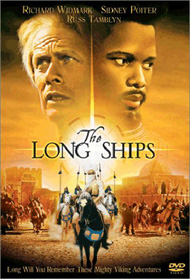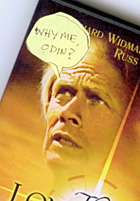| Release List | Reviews | Price Search | Shop | Newsletter | Forum | DVD Giveaways | Blu-Ray/ HD DVD | Advertise |
| Reviews & Columns |
|
Reviews DVD TV on DVD Blu-ray International DVDs Theatrical Reviews by Studio Video Games Features Collector Series DVDs Easter Egg Database Interviews DVD Talk TV DVD Talk Radio Feature Articles Columns Anime Talk DVD Savant HD Talk Horror DVDs Silent DVD
|
DVD Talk Forum |
|
|
| Resources |
|
DVD Price Search Customer Service #'s RCE Info Links |
|
Columns
|
 |
The Long Ships
|
||||
The Long Ships is a sometimes-interesting, always-fun total botch, an attempt to repeat the success of Richard Fleischer and Kirk Douglas' The Vikings of several years previous. To this end, producer Irving Allen hired cinematographer-turned director Jack Cardiff from that film, but made the picture in Yugoslavia to save money. The only way to account for the erratic final result is to point at the gross miscasting and waste of good actors in minor roles. Much of the film appears to be played for laughs that aren't in the script.
Frans G. Bengtsson apparently wrote a well-researched and thoughtful book about an adventurous Viking called The Long Ships, which this film turns into a bizarre kiddie adventure. Producer Irving Allen's filmography consists of mostly action films and the Matt Helm series, with a few more ambitious pictures along the way. With a cast and production leading one to expect a more ambitious project, The Long Ships is a real embarrassment. Without its stars, it would play like any other early 60s Italian sword and sandal movie. The Vikings was so beautifully produced and directed that it almost reached a higher bracket of ambition. It had neither the Biblical overtones nor mytho-historical reverence of pictures like Barabbas or El Cid and only now is recognized as a superior show. By contrast, The Long Ships comes off as a feeble joke, an unfunny satire on action-costume pictures. Richard Widmark uses his patented chortling laugh, but is essentially charmless as a Douglas Fairbanks-style rogue, the sort who will lie to his own brother for another chance to go to sea. He's first seen narrating a tall tale for some Berbers in imitation of a scene from The Thief of Bagdad. Next, he's stumbling ashore back home in Norway, apparently none the worse for wear after crossing the whole of Europe in his Viking togs. A couple of hours later, he's off again in a stolen boat. Sidney Poitier must have been plenty tired of playing idealistic young black Americans - maybe the opportunity for a summer in the sun as an Arab villain was a case of Now For Something Completely Different. Without smiling once, Poitier goes Berber as if nobody told him everyone else was playing for laughs. He's far too handsome and poised to be sullied by the role, but I can't imagine he was pleased with the results. Some reviewers thought the role was insulting, but it must be sour grapes from the kind of fans who would insist Poitier always be the hero. Russ Tamblyn has a solid presence here. He looks like the only guy taking things seriously in the dramatic scenes, and is also the only one with the right pitch to survive the silly comedy. Recently cut loose from MGM, he was a great talent soon to spiral into exploitation pictures. Frankly, the film plays as if its big-name talent treated the production as a paid Mediterranean vacation, with a silly film to make on weekdays. The rest of the casting is a ridiculous mess of actors squandered. Edward Judd of First Men IN the Moon takes over the Gary Raymond turncoat role from Jason; I can imagine him on the set reading of the huge 007 success of previous peer Sean Connery and realizing his career is slipping away. Fine actor Colin Blakely (The Private Life of Sherlock Holmes) is reduced to a leering clown. Oskar Homolka's entire performance as shipbuilding paterfamilias is his big fake laugh, and makes one miss Ernest Borgnine in The Vikings. His character name is 'Krok' would also seem to be his opinion of the movie. Gordon Jackson (The Great Escape) and Paul Stassino (Thunderball) are barely given any screen time. Finally, the wonderful Lionel Jeffries plays a harem Eunuch named Aziz. In blackface from head to toe and given a silly topknot of hair, the role might as well have gone to an unknown: if he had any memorable lines or scenes, they've been cut out. It's probable that The Long Ships originally had a much longer script where all of these actors had characters to play. Perhaps the editorial solution was to jettison the detail in favor of generic action and a series of foolish scenes where Vikings chase Poitier's voluptuous wives around the harem. These frolics have the finesse of your average Three Stooges short. At age 12, I'm sure I thought they were a riot, but I imagine adults were bored when the expected adventure thrills collapsed into dumb jokes that Hope and Crosby would reject. Likewise, the action scenes are energetic and not much more. They were engineered by Cliff Lyons, an old pro from John Ford movies who was apparently a fast worker with a limited number of tricks up his sleeve: the horsefalls, wire gags, and fight choreography in this film are identical to the big action scenes in the 1955 The Conqueror and 1965's Major Dundee - probably with some of the same stuntmen in all three films. The film doesn't hide its cheapness. The Yugoslav coast stands in for Norway, so the elaborate Viking village looks as if it's in a relative desert. Irving and Cardiff brought key photographic people with them, but all the designers appear to be part of the Yugoslav half of the production. As a result the sets are cheap and uninspiring, and the rather large Berber town looks like the paint's still wet. The most effective setting is a bare stretch of beach where Rolfe's wrecked boat lies defenseless against Aly Mansuh's cavalry. Even the costumes are dull - beautiful Rosanna Schiaffino is made to wear trashy girlie-harem get-ups with dumb fake-nude sheer fabric over her midsection. The Viking outfits are leather garb with short-shorts and lots of bare arms and chests. Not only is the costuming impractical, Rolfe's manly-men Vikings look ready for a gay pride parade. Screenwriter Beverley Cross lent mythological expertise to Jason and the Argonauts but this script was either dashed off in haste, or it was abandoned in favor of the harem & 'More ale!' nonsense. The Viking women are represented by 'lusty' Ylva (Jeanne Moody) who can't entice Tamblyn into the steamroom to 'take care of him', and a Princess (Beba Loncar) who pouts, gets roughed up on the boat and is almost seduced by Poitier on a California King Berber bed. Poor Ms. Schiaffino has one or two limp scenes before getting a spear in the belly for no good reason. We have no inkling of what kind of ruler Poitier is - all he wants is his foolish bell. The silly bell is found hiding in plain sight where any shepherd who rang the clapper would figure out its secret. It looks like half of Rolfe's crew are brutally killed when the bell rolls off a cliff with them chained to it. Widmark's only retort is a cheery, "Well, that was the quick way!" The big bell is supposed to be 20 feet tall and made from solid gold (Bond title meister Maurice Binder provides a tacky opening sequence explaining its origin). Even when encased in plaster, it rings like it's hanging in Notre Dame. A few moments later, when it hits the water, it floats. At this point, even credulous 5 year-olds abandon all hope. This moment in stupidity equals the opening of Voyage to the Bottom of the Sea where a freak cataclysm breaks up the arctic ice floe into huge chunks ... which sink. Many kids probably didn't notice the floating bell, as it follows the real 'good grief' item in The Long Ships, a grotesque execution device called The Mare of Steel. Sword and Sandal movies often had sadistic tortures that provided thrills and the occasional nightmare. 1 The Mare of Steel is unlikely and exceptional. It consists of what any kid recognizes as a playground slide, except the slide part is a long curved blade, like an Arabian sword. We see one victim voluntarily take the slide chest first, off-screen of course; I'm sure that hundreds of thousands of kids got chilled blood visualizing his grotesque bisected corpse. The effect of the scene is to punch a big hole in the movie. It's a little too personal being asked to imagine the experience. As it is, we cut back to the contraption a couple of seconds after the first victim 'rides' it. There's no corpse, just a red smear on the receiving platform below, redundantly covered in spikes. Frankly, the whole concept didn't belong in a film to be shown to kids, especially not in 1964. At the end, the few Vikings defeat all the scurvy Arabs, everyone has a hearty laugh, and con-man Widmark starts pitching tall tales again. We're to assume that King Harald somehow transports the un-transportable bell back to Norway. If gold bullion can't be stacked more than 6 bricks high without deforming, wouldn't this solid gold bell eventually collapse from its own weight? Columbia TriStar's DVD of The Long Ships is a reasonable but unflattering presentation. The transfer compares badly with The Vikings. It was also shot in Technirama (and blown up to Super Technirama 70, according to resource books), and I was told was remastered from original elements, but colors are on the smeary side and the picture lacks punch. The mono sound is okay, but the repetitive score is bland. There are no extras. The tasteful cover art looks better than the original poster, which I believe showed a Viking ship in a storm much more impressive than the bad miniatures in the movie. In hindsight, the caption 'Long Will You Remember These Mighty Viking Adventures' on the disc box comes off as a joke at our expense. The only way to approach The Long Ships critically is to treat it as one big goulash of mistakes. If one remembers the show from childhood - it got a big, if brief, release - it'll be fun to see again. It's certainly entertaining in a 'how did it get this stupid?' way. It was a sorry career turn for the talented Jack Cardiff. He was nominated for an Oscar for Sons and Lovers, his first directing job, but that success didn't lead to greater things. Last week I wrote in the Savant column that the two discs I missed from 2003 were The Silencers and this one. A frequent correspondent wrote that he bought the disc and showed it to his wife. They both found it so terrible, it was a choice of tossing it out the window or mailing it to me as a gift. So Savant gets an early Xmas, with hearty thanks ("More ale!") ... I've never been embarrassed by my guilty pleasures. This is my only excuse for reviewing the film half a year after its release. 2
On a scale of Excellent, Good, Fair, and Poor,
The Long Ships rates:
|
||||
Review Staff | About DVD Talk | Newsletter Subscribe | Join DVD Talk Forum |
|
| Release List | Reviews | Price Search | Shop | SUBSCRIBE | Forum | DVD Giveaways | Blu-Ray/ HD DVD | Advertise |







